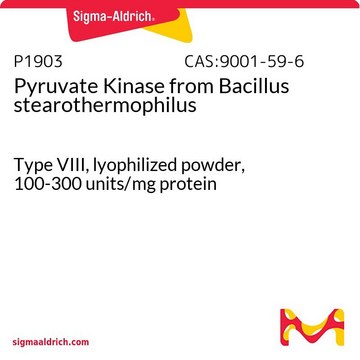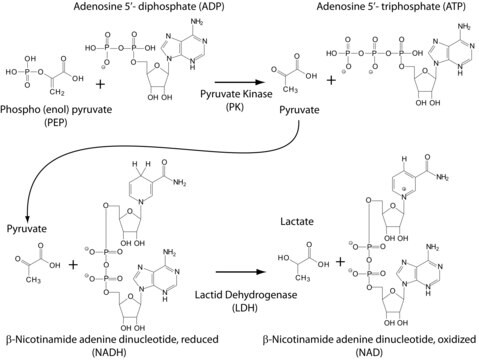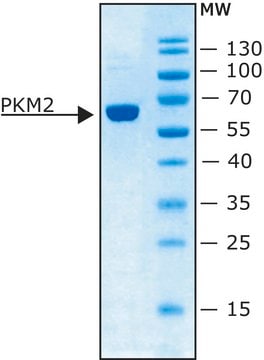SRP0189
Pyruvate kinase M2 Active from mouse
recombinant, expressed in E. coli, ≥90% (SDS-PAGE)
Sinonimo/i:
M2-PK tumor, OPA-interacting protein 3 (OIP-3), Pyruvate kinase 3 (PK3), Pyruvate kinase, muscle, Thyroid hormone-binding protein 1 (THBP1)
About This Item
Prodotti consigliati
Origine biologica
mouse
Ricombinante
expressed in E. coli
Saggio
≥90% (SDS-PAGE)
Forma fisica
aqueous solution
PM
58 kDa
Confezionamento
pkg of 20 μg
Condizioni di stoccaggio
avoid repeated freeze/thaw cycles
Concentrazione
>0.02 mg/mL
N° accesso NCBI
N° accesso UniProt
Condizioni di spedizione
dry ice
Temperatura di conservazione
−70°C
Informazioni sul gene
mouse ... PKM2(18746)
Descrizione generale
Murine Pyruvate kinase M2 (PKM2) (GenBank Accession No. NM_011099), amino acids 2-end, with N-terminal His tag, MW = 58kDa, expressed in an Escherichia coli expression system.
Applicazioni
Azioni biochim/fisiol
Definizione di unità
Stato fisico
Nota sulla preparazione
Certificati d'analisi (COA)
Cerca il Certificati d'analisi (COA) digitando il numero di lotto/batch corrispondente. I numeri di lotto o di batch sono stampati sull'etichetta dei prodotti dopo la parola ‘Lotto’ o ‘Batch’.
Possiedi già questo prodotto?
I documenti relativi ai prodotti acquistati recentemente sono disponibili nell’Archivio dei documenti.
Articoli
We presents an article about the Warburg effect, and how it is the enhanced conversion of glucose to lactate observed in tumor cells, even in the presence of normal levels of oxygen. Otto Heinrich Warburg demonstrated in 1924 that cancer cells show an increased dependence on glycolysis to meet their energy needs, regardless of whether they were well-oxygenated or not.
Il team dei nostri ricercatori vanta grande esperienza in tutte le aree della ricerca quali Life Science, scienza dei materiali, sintesi chimica, cromatografia, discipline analitiche, ecc..
Contatta l'Assistenza Tecnica.






